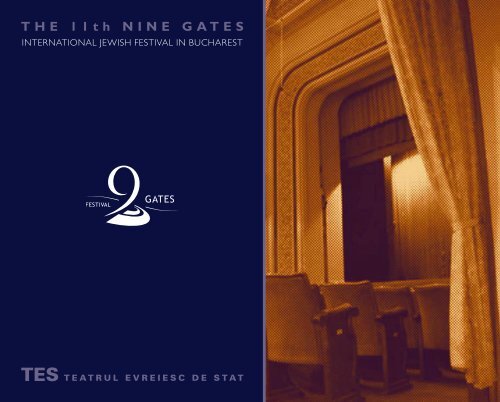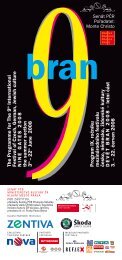Create successful ePaper yourself
Turn your PDF publications into a flip-book with our unique Google optimized e-Paper software.
THE 11th NINE GATES<br />
INTERNATIONAL JEWISH FESTIVAL IN BUCHAREST<br />
TES teatrul evreiesc de stat
May 26 and 27, 2010<br />
The Czech Jewish Festival Nine Gates in Romania<br />
Under the auspices of<br />
the Prime Minister of the Czech Republic, Jan Fischer<br />
the Minister of Defense, Martin Barták<br />
the Lord Mayor of Prague, Pavel Bém<br />
Venue:<br />
Teatrul Evreiesc de Stat<br />
www.tes.com.ro<br />
Adress:<br />
str Dr. Iuliu Barasch 15, sector 3, Bucuresti<br />
The Nine Gates festival<br />
in Romania have been organised<br />
with cooperation<br />
of the Czech Centre in Bucharest<br />
Free tickets at the box office of Teatrul Evreiesc<br />
3
The Jewish Theatre in Romania has a 130 year’s long tradition. It began in 1876 in Jassy, when Avram Goldfaden laid the foundations of the<br />
first professional Yiddish theatre in the world. Continuing this tradition, the State Jewish Theatre in Bucharest (with Harry Eliad as director<br />
since 1990) is striving to maintain alive the flame of Yiddish language and culture. The Jewish Theatre repertory embraces first of all plays<br />
and adaptations of the great Yiddish literature as well as translations into Yiddish from the world drama. The performances are unique<br />
by their special humour and melancholy, the charm of klezmer music and folk dances. The troupe disposes of the whole range of artistic<br />
means: from metaphorical style to the robust authenticity of traditional comedy and the sophistication of modern theatre.<br />
In the last quarter of a century the theatre has toured successfully to the USA, Canada, Israel, Germany, Austria, Russia, Switzerland,<br />
Hungary, Great Britain, France, Greece and has participated in several international festivals.<br />
4
Nine Gates, the festival of Czech-German-Jewish culture, has<br />
already for eleven years been reliably presenting international<br />
Jewish culture to the Czech audience. This project is unique<br />
in its concept and size in the region of former Czechoslovakia, the<br />
importance of which transgresses the borders of our country.<br />
The basic idea of the festival is to present to<br />
the Czech audience Jewish culture that is alive,<br />
thriving and inspiring.<br />
Each year the festival awards a “Grand Prix” of Nine Gates –<br />
a Chrystal Menorah. The award is given for contribution to both<br />
Czech as well as international Jewish culture. The festival also<br />
awards best films, both documentary and feature film.<br />
The Chrystal Menorah has in the past gone to amongst others,<br />
the writer Adolf Burger, the film directors Roman Polanski and<br />
Jan Němec, the actor Vlastimil Brodský<br />
and the writer Arnošt Lustig.<br />
www.9<strong>bran</strong>.cz<br />
5
26. 5. 2010, at 6 pm.<br />
State Jewish Theatre, TES<br />
Opening of the Exhibition<br />
„Neighbours Who Disappeared“<br />
a Project (started in 1999 under the auspices<br />
of the Office of the president Vaclav Havel)<br />
and „Tribute to the Child Holocaust Victims“<br />
The Education and Culture Centre of the Jewish Museum in Prague (ECC JMP) in collaboration with its project partner Forgotten NGO, with<br />
a support of the Terezín Memorial, Hidden Child, Czech Federation of Jewish Communities, invite anyone interested to participate in a unique<br />
project called „Neighbours Who Disappeared“. This project is a social phenomenon of the Czech Republic. In the light of strong assimilation of the<br />
Jewish population till 1939 and following radical change and in the shade of the period 1945-1989, which did not care of the gradual devastation<br />
of historic sights and religious life, the path on vanishing traces of local Jewish settlement might for young people become a find of special context.<br />
The goal of the project NWD is to help students 12-21 years old to formulate questions, which relate to the fate of the people who have<br />
disappeared during WW II in their neighbourhood. Students are doing research into local and state archives, in Terezin Memorial and other<br />
related organizations, oral history with witnesses and survivors. Then they are preparing brochures or collection with family photos and<br />
documents, often as a first research about Jewish Community life in their town.<br />
The II. stage of the project called A Tribute to the Child Holocaust Victims addresses again young people aged 12 -21 and proposes that they<br />
work independently on the stories of people who lived with their neighbours in a harmony until WWII and who were then mostly marked,<br />
restricted, persecuted, and finally liquidated. This project‘s topic, however, is in the<br />
first place the life of the children and youngsters in the same community where<br />
children - participants live today. The output is a digital tablet permanently placed<br />
in each participated school accompanied by web-sites, brochures and volumes<br />
presented as a report about students research work. These outputs are based on<br />
the students long-time-self learning project and common local activities (schoolsarchives-libraries<br />
and cultural centres- families-municipalities).<br />
Supervisor and coordinator:<br />
The Education and Culture Centre of the Jewish Museum<br />
in Prague, Maiselova 15, Prague 1, 110 00, Czech Republic<br />
Methodologist and coordinator:<br />
Marta Vančurová (martavan@gmail.com), mobile: +420 603 147 074<br />
6
26. 5. 2010, at 7 pm.<br />
State Jewish Theatre, TES<br />
Film<br />
Documentary film<br />
„ Short Long Journey“<br />
Czech Republic 2009, 82 min.<br />
„About people, not only about Jews, about the evil in us, not only about the holocaust, about the present not only about the past“<br />
In April 1945 Vojtech Gál was murdered on the way from Sachsenhausen to Schwerin. In April 2008 his son walked the same route in<br />
an attempt to find his father’s grave and leave a testimony. He was accompanied by friends, film makers and fellow pilgrims. They did not<br />
understand everything they came across. They could not comprehend some of the people with whom they talked. But it never occurred to<br />
them even for a moment that they were travelling without aim and meaning. They give harsh personal witness of their journey, anticipating<br />
neither agreement nor tolerance.<br />
Theme: Fedor Gál<br />
Camera: Richard Krivda.<br />
Dramaturgy: Jiří Gold<br />
Music: Marian Varga<br />
Photography: Miro Švolík<br />
Graphic design: Radana Lencová<br />
Editing: David Vojta<br />
Director: Martin Hanzlíček<br />
Producers: Fedor Gál, Jarmila Poláková<br />
Duration: 82 minutes<br />
The film was made with the support of<br />
the State Fund of the Czech Republic<br />
for the Support and Development of Czech Film<br />
7
26. 5. 2010 at 9 pm.<br />
Feature film<br />
Diamonds of the Night<br />
1964, black and white, 64 mins<br />
Director: Jan Němec<br />
Producer: Miloš Bergl<br />
Screenplay: Arnošt Lustig, Jan Němec, adapted from<br />
Lustig’s novella Darkness Casts No Shadow (Tma nemá stín)<br />
Photography: Jaroslav Kučera (and Miroslav Ondříček)<br />
Editor: Miroslav Hájek, Jitka Šulcová<br />
Design: Oldřich Bosák<br />
One of the earliest Czech New Wave films, Jan Němec’s debut feature Diamonds of the Night (Démanty noci) is also one of the most<br />
startling, and remains a thrillingly original piece of cinema even today. Shot largely hand-held and virtually dialogue-free, it follows the desperate<br />
journey of two teenage boys who successfully escape a train bound for a Nazi concentration camp, only to find themselves hunted<br />
down by a band of old men whose physical decrepitude doesn’t make them any less lethal.<br />
It was based on the novella Darkness Casts No Shadow (Tma nemá stín) by Arnošt Lustig, an Auschwitz survivor who became one of the<br />
main Czech chroniclers of the Holocaust, and who himself managed to escape from a Dachau-bound train after it was bombed by the Americans.<br />
Lustig co-wrote the screenplay and would later cite the film as his personal favourite of all the adaptations of his work.<br />
8
27. 5. 2010, at 7 pm.<br />
State Jewish Theatre, TES<br />
Concert<br />
NACHES<br />
The Klezmer band NACHES interprets the traditional and the not so traditional folk music of the East European Jews. The band has taken<br />
part of many important Klezmer festivals, for example KlezFest in the UK. All songs are performed in Yiddish by Barbora Baranová.<br />
Jakub Černohorský – violin<br />
Tomáš Novotný – concertina<br />
Tomáš Filip – double-bass<br />
Rostislav Mikeška – percussion<br />
Barbora Baranová – vocals<br />
Free tickets at the box office of Teatrul Evreiesc<br />
www.teatrul-evreiesc.ro<br />
9
the festival wishes to thank:<br />
Jan Schneider<br />
Zdeněk Zbořil<br />
Martina Storek<br />
Zdeněk Mareš<br />
Miroslava Nováková<br />
Zuzana Svátková<br />
Vít Prudil<br />
Milan Kupka<br />
Jana Počtová<br />
Zuzana Matoušková<br />
Alena Konopíková<br />
Klára Málková<br />
Petr Duhan<br />
Robin Böhnisch<br />
Pavel Trpák<br />
10
co–organiser<br />
main partner<br />
excklusive<br />
tv partner<br />
media partner<br />
partner<br />
12



